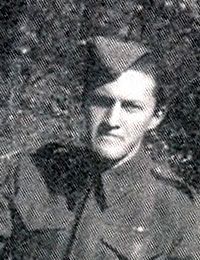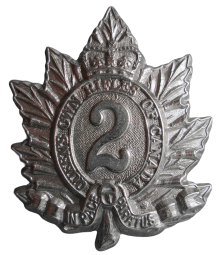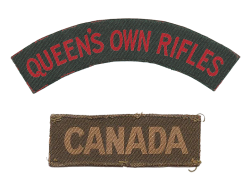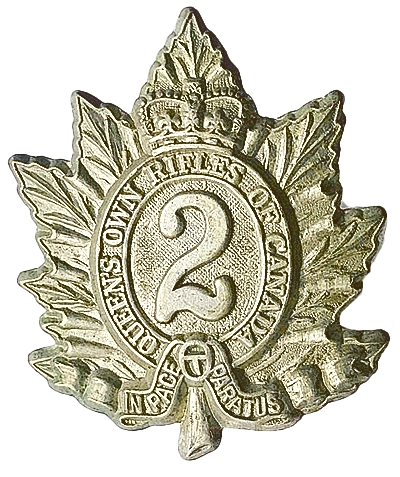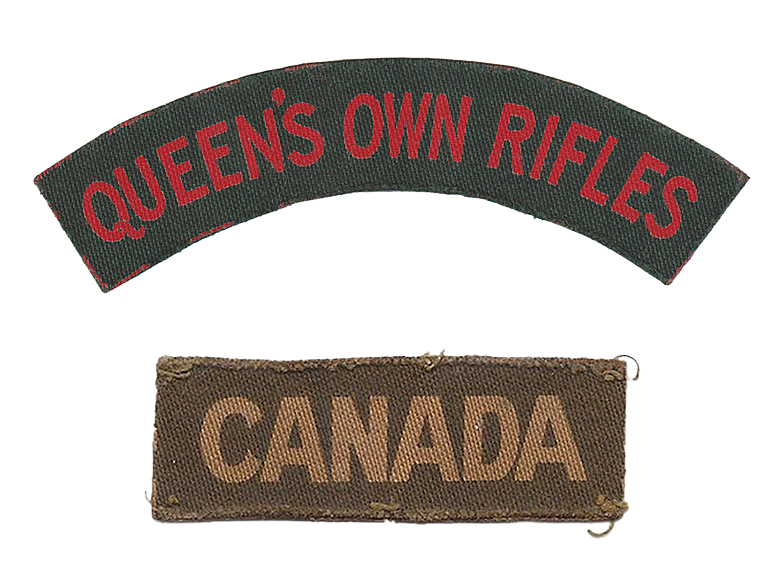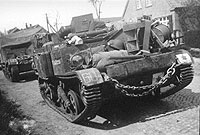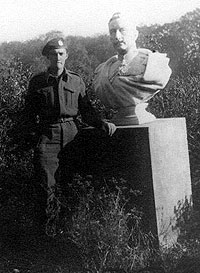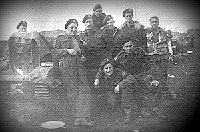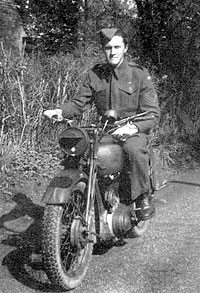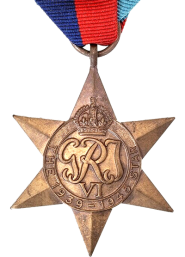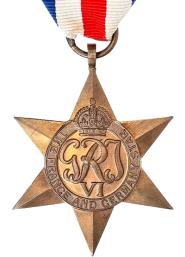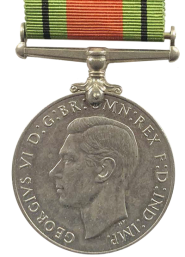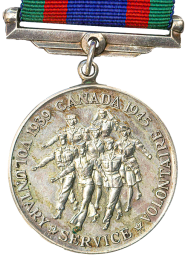I (John Anthony Marin ) was born in Kilmar, Quebec, the son of Luigi Marin and Giacomina Bottan. In my early years, our family moved to Cardinal, where I went to the local public and continuation schools. During my teenage years, I joined the Brockville Rifles Militia and completed training at Petawawa. At 18, I began active military service. Before being shipped overseas to England, I served on the west coast of Canada. Not long after arriving in England, I joined the Queen's Own Rifles, a unit with a proud history dating back to 1860.
I began as a dispatch rider for the mortar platoon, later serving as a forward observer. My service took me through France, Belgium, Holland and Germany, where I remained until the end of the war. I will share my memories about the Netherlands and Germany.
The Netherlands
It got pretty cold in January and the QOR network seemed to be working pretty well as we started receiving boxes of scarfs, socks and gloves, that had been sent over by some kind ladies who were connected to the QOR of C Chapter of the Imperial Order Daughters of the Empire, I never did find out who they were, but we sure appreciated the items. We usually wore our socks for a week or two at a time and when we moved to Nijmegen, some other organization starting socks over by the hundreds, all hand knitted. From then on I changed every week and left the 'dirty' ones where some civilian could find them. I was too lazy to wash them. At least they wouldn't be wasted. In mid-January, a bunch of us were given four day passes to Brussels. The trip there was quite an ordeal, since we all rode in the back of a 60 cwt. truck, with no heating and the gas fumes coming in under the truck flaps. It's a wonder that we survived.
When we arrived, we were all billeted at a large hotel and even had private rooms. What a luxury. I headed for a liquor store called 'Simone Simon.' Kind of a strange name, but that was the name of the owner. I asked him if had some good Cognac and he started opening some bottles. When I asked him what he was doing, he replied that one should always sample a bottle of wine before buying! I bought five bottles of the best. That night I went out to see the town and ended up at a large dance hall, with a full size orchestra, playing. As was usual in that part of the world, they played fast and loud, almost like a marching band. They drank a couple of my bottles of cognac and played Strauss waltzes for me all night.
The next morning I was awaken by a loud pounding on the door. It was the housekeeper coming to make up the beds, another surprise. I had been warned to leave a tip or else the housekeepers would likely steal something. I left a 20 franc note, and when I returned that night everything was OK. Some of the boys had some equipment missing. That night we went to a cafe for a drink and the first thing I knew, the female in charge came over with ten lovely looking gals and for a price we could take our pick! I picked out a pretty dark haired gal and she was a little nervous. I guess she was just an apprentice. It was a waste of money. I went back to the dance hall to listen to the music.
The last night saw us back at the dance hall again and I had my last bottle to finish. Two ladies came in and sat at my table. It was a mother and her twenty year old daughter. After they drank half of the bottle of cognac, they started to get friendly. They couldn't speak English and I didn't speak French too well, but we got along OK. I told the old gal that I wanted to have a 'go' with her daughter and she laughed and with her hands made a motion to mean that her girl would get pregnant. I threw some condoms on the table and after a while she said that it would be alright. So I was invited to spend the night with them. It was a lot of fun, the daughter must have been practicing, because it was quite a session! The next morning, her mother brought us breakfast in bed!
Since all good things have to come to an end, I got dressed and was ready to leave, when the door bell rang. It was the girls 'boy friend,' an English soldier coming to visit his girl. What a laugh! The mother explained that I was a friend who had just dropped in to say hello, and was leaving. I couldn't get out of there fast enough. It was a long trip back, with a hangover! Near the end of January, we moved to a small village, called Nebo. Here we stayed in houses. This was a welcome change from sleeping outside or in barns. Some of the boys went out and 'discovered' some empty houses and they returned with a pile of mattresses. The next item that was borrowed was a piano and it was pushed down the main road and set up in one of our billets. One of the guys could play very well and thus we had a little entertainment. A week later we moved again. This time closer to the city and the billets were a lot better. Some of the civilians let us use the basements for cooking and even let us use the dining area for taking our meals.
Being closer to the city meant that we could go out and look around the place. Nijmegen was a nice place with some damage from the shelling and bombing when the Airborne had landed. The place was full of troops and we knew that this time out wouldn't last long. A lot of 5.5 guns were being brought in and placed at about one hundred yard intervals, all aimed to the east. There was one just outside our house and the gun crew stayed in the basement. Outside there were huge piles of ammo, for the guns. We knew that something big was going to take place very soon. More recruits started arriving again and the whole battalion started battle drill courses. This was necessary to give then some ideas of what was coming up. What a time for this exercise, with the snow coming down and the whole place like a mud hole. It was a case of grin and bear it. The only good part was that we were still able to stay in some of the houses. One of the guys disconnected the gas line to the kitchen stove and turned on the gas and lit it. The flame shot out three feet and warmed us up! It was a wonder that the place didn't burn down.
Since we were using some of the house facilities, toilets, washing and heating, it was decided to keep track of the water, gas and hydro used. I had the job of going around the dozen houses and checking all the meters. At one place I met the prettiest girl that I had ever seen and she took me down to the cellar to show me where the meters were. She could speak a little English and I guess we must have taken too much time, because her father came down and gave her hell in Dutch. I couldn't make out what he said but he looked kind of mad. One of the boys used to write to her after the war, but I don't know if anything ever came of it. We had a great time for a week or so, playing cards at night and drinking some of the good Dutch gin. Everything was in short supply so we gave them whatever we could do without. The people sure appreciated it and when we finally had to pull out, it was almost like leaving home!
After nearly three months stay in Nijmegen, it was rumored that there were five hundred girls pregnant! I wondered who the lucky guys were. I think that some of the citizens were glad to see us move out. During this period of rest and overhauling of the equipment, I was sent to Ravenstein along with six other soldiers, to take a course on operating the new radio sets. Ravenstein is twelve miles from Nijmegen and is a pretty little village. The first thing I noticed was, that the citizens swept off the sidewalk and road in front of their houses and places of business.
We had three days of instructions in operating the sets and then we strung a wire about four blocks to our billets. I had the headset hung on a nail, by my bunk, and in the morning I could hear music coming out from the earphones. It seems that the long wire acted as an aerial, so we put the earphones in a tin dish and you could hear the music all over the barracks. One day while walking around the village, I met a pretty young lady, and was invited up to her home for a meal. What a surprise, she had ten sisters. Her father was the local high school principal. I don't know how her mother managed it, but she put on a great meal. Afterwards the girls took turns playing the piano, in duets and also three at the same time. The father taught music at the school and that was how the girls got their love of music.
The village people were so nice to all of us, they thought we were heroes or something. I asked the Officer in charge if we could have a small celebration before we left and he was a little curious as to what I had in mind. I suggested that we could invite the town folks and have some music and coffee and doughnuts. He said to arrange it with the cooks. When I told the cooks what we were planning, they said they didn't have any supplies. I had seen them taking food out to the black market at night to sell and make some money for themselves. When I told the cooks about this they were kind of mad at me but in the end agreed to supply the coffee and food. Everyone had a good time and the people really went for the food. I still have pleasant memories of that village and I have a photo showing all ten girl lying on the river bank. All too soon it was back to Nijmegen and the big push into Germany.
Germany
The battle plan was to be carried out in two parts. Part one was to clear out the enemy in the northeast sector along the Rhine river and the second phase was to clear them out of the Siegfried Line and the Hochwald forest area, to the southeast. The Siegfried Line consisted of a great number of concrete piers, that were intended to keep out the tanks. Someone had hung up some signs advertising that this was the famous Siegfried Line and some clothes and rags were hung up on a line, with a sign stating that this was the washing hanging on the Siegfried Line. At the time there was a popular song out called 'Oh we'll hang out our washing, on the Siegfried Line..., etc."
On the morning of February 8th, I was awaken by the noise of the big 5.5 artillery guns that were outside our billets. It was around 3.30am (0330 hrs.) . I watched them for a while and went back to sleep. I woke up around 0700hrs, when a loud bang shook the house. One of the 5.5' shells had exploded in the breech of the gun and parts of the barrel were peeled back, the way you would peel a banana. The Sergeant in charge lost his leg and two others were injured, but no one killed. There were 1.200 guns of all sizes firing for eight hours, along with the 4.2 and 3 inch mortars.
Also for the first time 'Monty's' moonlight was used. Large searchlights were turned on and aimed towards the enemy sites and the beams were deflected off of the clouds. This lit up the area for the attackers and partially blinded the enemy. It was still scary for the infantry to go forward. The Germans had flooded a large part of this area, which meant that they were also stranded on isolated bits of ground, and these pockets were blasted by the artillery and bombers. Some of the smaller towns were wiped out completely. By the 11 February the water was so high that most of the troops were taken out by the Buffaloes and American D.U.K.Ws. This was a truck and boat combination that worked well on the water.
The next phase was started with almost the same type of bombardment and the attack was started in the morning of February 26th. Monty's moonlight was used again and did prove effective and may have helped some. It was tough going for the infantry, we could see some of the actions. The new mortar platoon IC wanted to spot the mortar fire by himself, which was OK by me, so I stayed with the battalion HQ. Group. We kept going up towards the front, as the forward line moved up. There were shells flying all around us and it was a wonder we weren't hit. The sniper fire was the worse, when you heard the whine of the bullet it was too late to duck, it had already gone by!
We were a mile or so back of the 'front' and could see and hear the artillery fire accompanied by the attacking 'Typhoons.' There were a few small towns, being defended by some of the toughest German troops. I guess this was to be their last stand before the Rhine River, in this area. Some of the buildings changed hands several times, due to the fact that the platoons were down to less than half strength, and could not hold on when counter-attacked. One particular group of houses was in front of Major Dunkleman's sector. The enemy had just re-taken some houses from them and they were in danger of being overrun. I heard later that Sergeant Cosens, went kind of wild and talked a British tank driver into attacking several buildings. The Sergeant aided by some riflemen, managed to clear out the area and save the day. Later while he was going around checking on his men, he was killed by sniper fire. He was awarded the Victoria Cross, posthumously. I heard one Officer say, that he thought that this action was the worse since D-Day!
On March 3rd. the attack was started through the woods called the Balberger Wald. It was a mess with tanks running over land mines, that had been planted all over the area. When the infantry stepped off of the roads, they would step on small personnel mines that could blow your foot off. The carriers were left behind and a Sergeant, from the mortars, and I were going through the woods, when the shells started dropping all around us. I dove in one of the tracks left by the tanks and the Serg. fell on top of me, just as an air burst occurred overhead. Some of the shrapnel bounced off of his back pack. I think that he saved my hide that day. It was pretty bad just following along behind the infantry and I wondered how the chaps ahead of were surviving.
Some of the tanks were stuck in the mud and one threw a track just as the enemy started a counterattack. They were however beaten back, and the rest of the tanks went forward clearing out several buildings. The Colonel came up in his carrier with two men from the platoons and he told me to jump in. The battalion was moving up to consolidate the ground covered by the tanks. The two men were dropped off at two points, to await the arrival of their platoons and the Colonel and I went up a short distance, got out and started walking up to a section of high ground. Just as we got near the 'T' section in the road we heard the 'moaning minnies' coming in, and the Colonel yelled 'hit the ditch." The mortar bombs fell all around us but the blast went over our heads. Then I was told to go up the road to a small group of buildings and the Colonel went the other way.
I felt kind of uneasy going up the road alone, with just my sten gun for company. When I reached the first house a German soldier came around the corner and just as I was about to shoot, I noticed a Red Cross arm band on him. There was a bunch of German civilians, beside the house, who were in the process of burying four people who had been killed by an incoming shell. The shell had gone in the cellar window and killed the four and wounded nine others. I went down to have a look and it was not a pretty sight. I knew that I was not very welcome there, but explained that some first aid people would soon be there to help them out. The German soldier was very cordial. The war was over for him!
When our mortar section arrived, I showed the Lt., to a house that I thought would do for the night. It wasn't good enough for him, so he looked around and picked out another one. He might have been a hero in the rifle company, but he didn't have too much personality. When we would be separated from the unit, during these phases of battle, we were pretty much on our own, in preparing meals, etc. The Lt. didn't like the way we looked after our ration boxes and thought that they should be under someone's watchful eyes. I got the job. When I mentioned to the gang, what he had said, Dunkleman's former batman pulled out a 45cal. automatic and pointed it at my stomach. He said those boxes are staying right here. I looked him in the eye and said that if it bothered him that much, he could leave the f...... things there. I turned on my heel and walked out, fully expecting to have him shoot at me. He was kind of an oddball and I don't think he had too much upstairs either, which made him a dangerous foe. I heard later that he was supposed to be the son of some Huron Chief. I had never trusted him from the first time that I had met him in France, so I steered clear of him from then on.
This operation had cleared the enemy, out of the west side of the Rhine River from Nijmegen to Wesel and the Americans were crossing the river south of our positions. It was time for the battalion to regroup and some trucks arrived to take us back to the Reichswald Forest for a rest. Everbody started looking around for old boards and pieces of tin, so they could build some temporary shelters, to keep dry. It looked like a shack city but it was better than sleeping on the wet ground.
Since we would be out of action for a while, some leaves were granted and I was lucky to be given a seven day pass plus two days traveling time. There were about twenty of us and we were taken to Nijmegen and put on a train for Calais, France. As usual the cars were full up and since it was an overnight trip, we had to sleep wherever we could. I crawled up on the overhead baggage racks and had some sleep. We were a great looking sight when we got on the ferry to Dover, England. On the way across, our Pay Sergeant mentioned that he was going to London to get married and wanted to know if any of us would be going there also. It seems that he wanted a Queen's Own to be his 'best man' at the wedding. Since I wasn't going anywhere in particular, I mentioned that I would be available.
His future in-laws lived in a lovely place in the west end of London and they gave me a nice welcome. I had not had a haircut for six months and I looked kind of scruffy so I asked his future father-in-law if there was a barber around. There were all closed, so we went to a friend of his, that had a barber shop and he gave me a nice trim, since it was for a special occasion. The wedding was held in an old church and it was a very nice ceremony. The strange part was, that after the wedding, we all boarded the train at Victoria Station and went to Brighton, on the south coast, for the reception. It was a real fancy dinner and dance. The first such party that I had ever attended. Someone had decided that I should be paired off with one of the bridesmaids, but stupid me, I had an eye out for another one. I found out later that she was already engaged. I think that I had a few too many drinks that night. A couple of times I wandered the halls looking for the young lady's room and the lady of the house kept steering me back to my room. The next day she told the others, that I was sleepwalking. She was a fine lady!
After we got back to London, I headed for Aldershot, to look for my brother. He had been wounded in Italy and had been shipped back to England for repatriation back to Canada. When I found him, I had another surprise, my brother-in-law had just arrived with a batch of reinforcements from Canada. Being married and working in an industry that was making tank parts, he had been exempted. I guess the shortage of 'cannon fodder' meant that all who could be spared were being shipped over.
After a few beers I caught the train for Brighton and then a bus for Henfield, to spend a few days with the Greenfields. I had 'picked up' a small accordion in Germany and I gave it to their son. I found out later that he learned to play it and had a small band also. I must have been a nervous wreck, because I think that I slept twelve hours a day. I know that the I felt better when I left them. I spent a couple of days in London with brother Joe and Fred. While we were walking around Trafalgar Square, two of the V2's came down about two miles from there and we could feel the shock of the blast. There was no air raid warning and no sound except the big explosion. At the end of my leave, they came down to Dover to see me off on the ferry boat. The trip back was a repeat of the trip down and I got back all tired out. There was a lot of activity going on and the rumors were that we would be crossing the Rhine River for the final push.
A lot of cleaning up had gone on while I was away. The troops had bath parades and were given some new clothes, so they looked like soldiers again. Trucks were checked over and some training started for the new replacements, that had arrived. They even had route marches. I think that the object of route marches, was to keep us all occupied. Near the end of March, we heard that the British had crossed the Rhine near a small town called Rees, and a floating bridge had been placed across, just East of there. On 28 March the QOR'S crossed over on the new bridge, aptly named the Lambeth Bridge. It was quite an experience driving on the floating span. The current was very fast and we kept thinking that it would fall apart. After watching a tank go over we were reassured that it was safe. After crossing the unit swung west towards Emmerich, Germany, and took over a sector from another battalion.
On the 31st of March, just north of Emmerich, the enemy were holding out in a wooded area, and the mortars were brought up along with the artillery to shell the woods. While this was going on the Lt. came over and told me that we had to go back across the river for more mortar bombs. I grabbed a 1500cwt. truck and after two hours we finally found the ammo depot. On the way back, after crossing the bridge again we got turned around and after cutting across some fields, we found the road again and discovered that we were lost. We ended up in Rees, which had been 'taken' by the British Commandos and they had gone on through. The town was deserted and the only person there was an Officer in a scout car, talking on his wireless. He yelled over and wanted to know what in hell we doing there. The Lt. jumped out and went over with his maps to find out were we where. Just then I spied a German flag hanging on a fireplace mantel in a hotel lobby. The front of the place had been blown out and I thought that it would be a good trophy to take home. I tore in the hotel lobby and I was looking for some wire to attach to the flag in case it had been bobby trapped. The Lt. started yelling to come on out and get going. I grabbed the flag and ran back to the truck. I think the Lt. wanted it, but I kept it and I still have it.
That night the mortar section stayed in a basement of an old stone house, it was lucky that we had. Later that night the enemy counter attacked and all hell let loose, with incoming shells and mortar bombs. Around 2000 hours, the Lt. decided that he should go and find out what was going on. He had been in the rifle companies and I supposed he was looking for new orders. He looked around the room and told me to get dressed and go with. I had just got suited up and grabbed the sten gun, when he said that he would go alone. Lucky for me that I stayed behind.
The Lt. was only a hundred yards down the road when a shell exploded behind him and flipped him in the ditch. He was pretty shook up, but was unhurt. That was one episode that I'm glad I missed. The shelling last for several hours and we were on alert all night. It must have been serious, for I even had to stand guard for two hours that night. When daylight was returning, I could see a dead German soldier about fifty yards away in the field. He might have been killed by his own artillery. We were happy to see daylight again. Night attacks were always a little hard on the nerves. By noon the next day, there were no enemy around the area. From there on it seemed that the Germans were using delaying tactics. It made for slow progress and the battalion was broken up into separate fighting units to search and destroy the enemy!
The main delaying tactics, employed by the retreating Germans, were blowing up the bridges, over the many canals and rivers that we were now encountering in Holland. This meant waiting for pontoon bridges to be brought up, and strung across. At one small town, instead of waiting, Major Dunkleman and his company simply waded across under heavy fire. The big problem was, that their weapons were all caked up with the mud and dirt. They had a lot of casualties clearing out the town called Rha. After two days of fighting the place was cleared and we all rolled into the city of Zutphen. The place went wild, with all the good town folks running out and hugging anyone they could get a hold of. After four years, they were sure glad to be free of the enemy!
As we continued up the main road, one of the platoons captured a bridge and a short time later were counter-attacked and some of the QOR's were taken prisoner. The next large town cleared was called Deventer. The welcome was tremendous and a real festive mood was starting to take hold. It gave us a chance to get washed up and clean our dirty uniforms. Everyone had a clean place to sleep that night. I'm not sure where all the booze came from but we sure had a wild time and a lot of headaches the next morning! To cap off the day we learned that our Anti-Tank Platoon had knocked off a German tank. Quite a feat.
We moved from town to town and it was strange that as soon as we took a place, the flags would pop up all over the place. The small towns were spotless and one could not help but wonder how the people had managed to keep their places so neat. We were making our way north-east, through Holland and it soon became apparent that the conditions were getting worse, for the people. The retreating Germans took everything that they could carry, with them, and the people were going hungry. In the city of Leeuwarden, the situation was so bad that truckloads of food were brought in. I remember handing out compo ration to the citizens and as hungry as they were, they were very polite and very happy to see us. The land was empty of any produce or farm animals. It had a sobering effect on us all.
The Battalion was still scattered all around the countryside, clearing out small pockets of Germans, who didn't seem to realize that it was over for them. A good many were cut off at the Zuider Zee area. The north-east section of Holland was cleared out and we stopped at Groningen, for a day and then headed on into Germany. Not too far inside Germany we came upon a prisoner of war camp. There were many French, Russian and Polish prisoners there. When we opened the gates they came out in a swarm and were grabbing and kissing anyone that they could get a hold of. A couple of them grabbed Sgt. Corrigan and he stepped back kind of embarrassed, and said that he would 'bop' the next one that tried to kiss him. The poor people were so glad to be free and we gave them some rations to help them out, until trucks could arrive to transport them away.
We were now starting to move up towards Aurich, and it was slow going. In some places the Germans had tied charges to the trunks of the trees along the road. The trees were made to drop across the road and in some places there would be ten or twenty of them to be cleared before we could go on. Another tactic that they used was to explode a 500 lb. bomb every hundred yards or so along the highway. This meant waiting for a bulldozer to come up and fill in the giant crater. In several places it was necessary to put portable Bailey bridges across, to save time.
I think it was on the first of May, when we pulled into a small town and the resistance had been fairly light, mostly mortar and sniper fire. We were in the east part of town and I was looking out the doorway, at some buildings, that were on fire in the distance, when I heard something hit the door jamb. It was a bullet from a sniper's rifle. It missed me by about a foot. I guess he had forgotten to allow for the wind. I dropped down to the floor and got the hell out of there in a hurry. I was a little shook up that night!
Since we were now on German territory, we had to pay more attention to all the places that we came to. The people stared at us wondering what would happen now that the Allies had arrived. Whenever we stopped for the night, we would carry out a search, of all the buildings. The houses and farm buildings were all in one unit and you stepped from the kitchen or shed into the cow barn proper. I was in one such barn looking around in case some soldiers were hiding out, and I spotted what looked like a storage area over the cows. I had one of the kids bring me a ladder so that I could have a look. The only things that I saw were a bunch of chickens and a lot of eggs. I gestured to the old farmer for his cane, so that I could reach the eggs. I filled up my helmet with them. I sure got a lot of dirty looks from all those watching. I don't know why, I did leave them the chickens! We had a good meal that night with 'whole' eggs for a change, instead of powdered ones. As we drove up a farm lane, there were several buildings that we had blasted with artillery, and in the yard, were the remains of a German soldier. He must have gotten a direct hit, the pieces were all over and some parts were stuck to the tree branches. It was a gruesome sight.
Several small towns were taken, in the next couple of days, without much opposition, since the Germans didn't want their places blown up. The end was getting near and the last battle was at a cross-roads just outside of a place called Ostersander. During the afternoon of May 4th, A Lt.Col. Haurumz and the Burgomaster of Aurich came in under a flag of truce They had surrendered the town of Aurich and all the area around there. One of the Sergeants had a camera and wanted to get the Col's. picture, but we had been warned about the taking of any photos. Since it was raining a little, I had my gas cape on to keep dry. The Sergeant gave me the camera and I stuck it out an opening and shot two photos of the Col., one with his flag and one of him on the motorcycle going back. We were then told not to fire unless someone fired at us.
The official 'cease fire' came through at 0800 hrs. on May 5th, 1945. It was kind of a shock to us and we all stood around looking at each other, thinking that somehow we had survived. No one said anything, that I can remember. I guess we all had our own thoughts, on what we had gone through and seen. The Battalion held a church parade at some small town, I am unable to remember the name, and I'm sure that all who could, attended. The battalion was going to be dispersed around some of the small towns as an occupation force. It was decided to send some of us up to look for suitable billets, since we would be staying with the civilians. Our Sergeant Corrigan and I were chosen from the mortar platoon and we rode in the 'bosses' carrier, driven by J. Tran. Someone handed me a sword with a piece of table cloth on it and we started our small convoy up to the German lines. As we drove along the road we could see the German soldiers still lying in their slit-trenches, with their machine guns handy. They neither smiled nor waved as we passed by and they looked weary, dirty and hungry and were probably happy that it was soon to be over.
When we arrived at the village, we dispersed and went looking for suitable houses. The Sergeant and I went in one house and opened doors to the various rooms to see what was available. I opened one door and did a double take. There were two girls in bed around sixteen and eighteen years old, and when I opened the door they sat up in bed and they were naked. They had beautiful looking breasts, at least that's what I thought at the time. I called to the Sergeant to come and have a look. All the while I was eyeing the gals. Just as the Sergeant got there, the girl's mother came running up and gave us 'hell' in German and slammed the door shut. She couldn't figure out what we were doing there, since the German soldiers were right outside. Needless to say, we didn't get to stay there! The war was officially declared over, two days later, on May 8,1945. With the war over, letters of congratulations, came in from the King, Churchill and the Generals in charge, telling us that the Canadians had done a good job!
We spent a week, billeted in houses, and this gave us a chance to get cleaned up. With boots all shined up and trousers ironed and haircuts, we started looking like parade ground soldiers again. We were not allowed to fraternize with the civilians and they kept their distance, probably wondering what was in store for the. It was good to be able to sleep between clean sheets again. I did a lot of walking around the city of Aurich, taking in the sites. It is an old city, with a lot of old buildings, but in good shape. They had missed the bombing.
A week later, we had a visit from the Brigadier, who handed out some medals to some of our surviving heroes. A lot of good men were missing from the ranks! He also announced that the QOR's would be stationed in Holland, while waiting to go home. Early on the morning of May 15th, we started for Holland. We stopped for the night at a place called Barneveld. The next day saw us arriving at Amersfoort, where we took over the barracks from an English Regiment, that was heading back to the UK.
